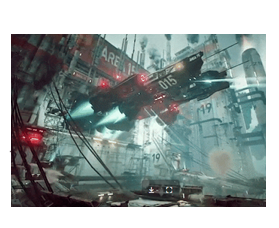Sound is an indispensable and crucial part in audiovisual media and games; its importance can hardly be overstated in modern-day game productions. With this DAE-major in Interactive Sound Production, we initially aim at imparting our students with an attuned set of programming skills. This part of the program enables students to fully grasp and function in various roles of a game development team (e.g. basic programming skills, knowledge of audiovisual language, math, physics, 2D & 3D, game engines, level editing, procedure and pipeline).
The DAE Interactive Sound Production program specifically zones in on the necessary skills to properly understand, integrate and communicate demands for a given game production’s sound design. Also, students are taught to produce and deliver pro-level quality audio to fit the practiced protocols and state-of-the-art requirements of contemporary game studios.
Unlike more artistic programs, we predominantly foster technical proclivities and accuracy; honing artistic sensitivities is subordinate to understanding and mastering the audio craft. We provide insights in 5 areas of game sound creation, namely:
• SFX / Music / Voice recording, Foley acting / Ambient
Within these fields, the focus is on creation, editing skills, integration and delivery. Graduates are assumed to have a proper working knowledge of recording/mixing/mastering, expert-level control of their Digital Audio Workstation (DAW), proper insights into how audio functions in-engine and by means of middleware, and readily applicable control on full audio project delivery and implementation.
As this major is closely linked to the game design curriculum, there is considerable overlap in the course material as well as the student profile. First and foremost, in this major you will train as a developer that is familiar with the production process of AAA games and that has proper programming skills (e.g. C++ and 3D APIs) for coherent real-time applications (game, AR, VR, simulation, ...).
As this major is specifically geared to sound design for games, you will learn most aspects of creation and integration of game audio. With the exception of movie scoring and theme composition, you will be confronted with the entire pipeline of professional audio in audiovisual and gaming applications. We train students to understand:
• how to create SFX from scratch,
• how to use libraries to sculpt unique and enjoyable soundscapes and ambient,
• how to properly edit loops, apply automation and FX,
• how to plan/cast/direct/properly record voices,
• how to properly apply various mic techniques to an array of sound sources,
• how to build a taxonomy of various sound classes and behaviors,
• how to implement said behaviors in both audio middleware (e.g. F-Mod, Wwise),
• how to set audio blueprints (e.g. sonifcation of animations) in various engines,
• …
Future job opportunities may include (but are not limited to): Sound Designer (for Game or Film Audio), Audio Director, Field Recordist, Foley Artist, Sound Editor, Re-recording Mixer, Mixing engineer, Mastering engineer, Voice Director,…
We do NOT prepare our student for a job as a Composer for Games or Motion Picture Soundracks, nor do we train live Audio Engineers or voice actors; even though some of the skills inherent to those crafts are tangentially touched upon in the Sound Design major.
CURRICULUM MAJOR Game SOUND Integration


